-
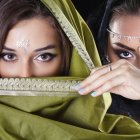 The Elegance of Cotton Sarees is Evergreen: 10 Different Types Of Cotton Saree You Must Have in Your Wardrobe (2020)
The Elegance of Cotton Sarees is Evergreen: 10 Different Types Of Cotton Saree You Must Have in Your Wardrobe (2020)
-
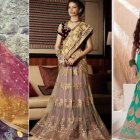 Rock the Latest Lehenga Trends: 10 Stylish Saree Lehenga Recommendations for a Scintillating Look (2020)
Rock the Latest Lehenga Trends: 10 Stylish Saree Lehenga Recommendations for a Scintillating Look (2020)
-
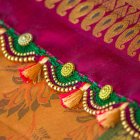 What is Saree Kuchu and How to Find the Perfect Saree Kuchu. 10 Must-Have Designs and Why You Should Use Them (2020)
What is Saree Kuchu and How to Find the Perfect Saree Kuchu. 10 Must-Have Designs and Why You Should Use Them (2020)
Six Yards of Beauty
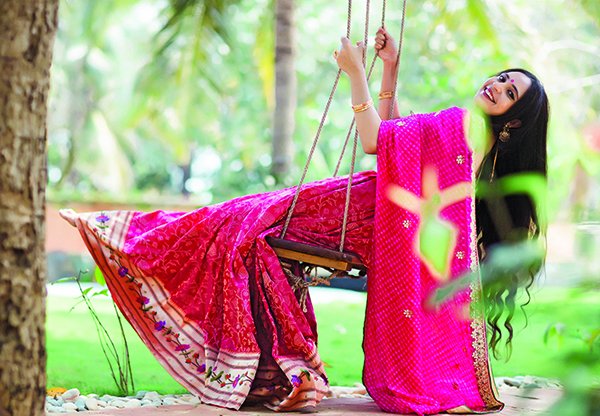
Saree is derived from the Sanskrit word ‘Shati’ which means ‘a strip of cloth’. It is a garment that represents Indian tradition, and it is almost uniformly worn by people of all strata throughout the country. Saree gives women an elegant and graceful look and serve a different culture. Different states and places of India have their style of fabric, patterns and draping styles. Like all other things, saree has gone through a lot of changes and evolution. With the shift in generation and their tastes saree has evolved various changes and today we see the sarees in a combination of tradition and western culture. There's an incredible range in saree types, eighty types of draping styles are found, and almost thirty types of traditional sarees can be found between five to nine yards of length.
Various Kinds of Sarees Across India - Regional & Traditional
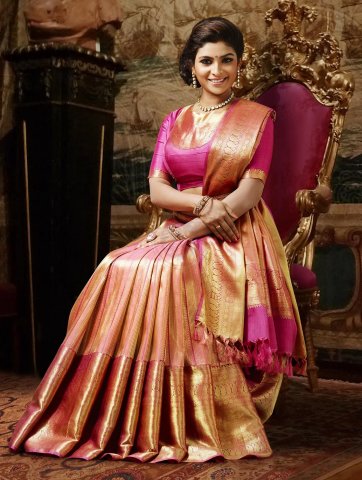
Every state has its variety of sarees, fabric and unique ways to use them. They use particular ways of weaving in different materials and different embroidery techniques.
- Tant from Bengal: Traditional saree from the land of Bengal with excellent artistry, and the fabric used to make Taant is pure cotton, and it is preferably used as daily wear. This saree is comfortable to wear with beautiful borders and prints.
- Bomkai and Sambalpuri from Odisha: Bomkai saree is also known as Sonepuri silk, which has ikat, embroidery and thread work and it is a nine-yard saree. Bomkai is available in cotton and silk fabric. Sambalpuri saree is a traditional fabric woven with different techniques; the threads are dyed before weaving which makes the fabric rich and fade-free in colour.
- Muga from Assam: Muga silk sarees are produced from a special kind of silk from the larvae that feed on mainly two leaves. The silk that the larvae generate is known to be the best, glossy and durable. The golden threads of the Muga can only found in Assam. Paithani from Maharashtra: Paithani is the famous saree from Aurangabad, and it is a hand woven silk saree which looks grand and elegant. Paithani has zari border, and it has a symbolic peacock design which makes it unique.
- Leheriya from Rajasthan: Lehriya is a form of bandhani sarees follows the different technique of tie and dye process.
- Phulkari from Punjab: The meaning if ‘phulkari’ is ‘flower work’ which is done in the saree with threads in bright hues in the shape of flowers. Phulkari is popular in the form of dupattas, and they are made with either khadi fabrics or cotton blends.
- Chanderi from Madhya Pradesh: Chanderi sarees are woven from the mixture of silk, zari and cotton fabric which makes it light like a feather, gives a high sheen and gorgeous look. It is straightforward to wear and one of the best material.
- Banarasi from Varanasi: In the past, Banarasi sarees were woven only for the royal people with real gold and silver threads. These sarees are best known for their exclusive gold and silver zari designs and motifs with detail work. These sarees are relatively heavy due to its rich embroidery work with gold, silver, zari or brocade on fine silk.
- Chikankari from Lucknow: Chikankari is the exclusive collection from the town of Lucknow, which is traditionally done on a muslin cloth. Nowadays it is available in almost all kind of fabric. Pochampally from Telangana: Pochampally silk is originated from the town Boodhan of Andhra Pradesh which has beautiful motifs, and geometric ikat designs. The fabric is a mixture of cotton and silk, and the look is royal and elegant.
- Konrad from Tamil Nadu: Konrad sarees were initially woven for the temple deities that is why it is popularly known as temple saree. The attraction of this saree is a wide border with stripes or checks fabric. It also has the animal or natural element motifs, but the edge is what makes this saree special.
- Kasavu from Kerala: Kasavu is a traditional saree, also known as Settu sarees which is a mundu (a dhoti), a blouse and a stole that went across the blouse. Many old ladies still keep this traditional wear alive. However, it has a modern version now, which has a thick golden border which is woven with real gold threads. However to make it simple, yet stylish colours and synthetic yarns are also used nowadays.
8 Attractive Saree Variety to Check Out
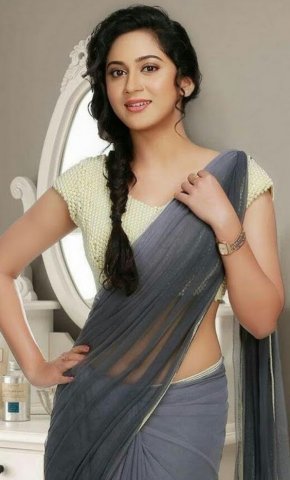
You have a range of sarees available in your wardrobe for different moods and time. but choosing a saree for any traditional occasion is a real confusing hunt. Here we have suggested some of the best possible online saree materials which you can think to buy as needed.
1. Banarasi Silk Saree
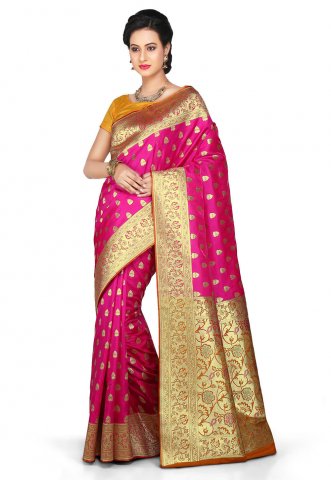
Banarasi Saree is one of the oldest traditional saree that was traditionally for the royal women but now worn by everyone for any significant occasions. In Bengal, Banarasi saree is utilised during weddings for the Bengali girls, preferably the bright red coloured banarasi saree, but it comes in all kinds of silks and shades. This banarasi saree is art silk-based, and the colour is bright fuchsia. The traditional drape is woven with zari which makes it shine like elegant royal wear. A blouse piece comes with this saree which is mustard colour and art silk based fabric in unstitched form. Fall and edging of the saree are done by the brand, and the price of the saree is Rs. 5,693 with free shipping.
2. Cotton Tant Saree
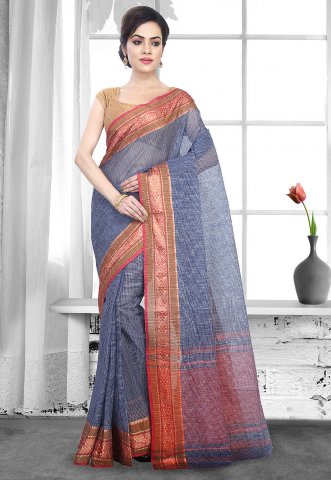
A traditional Bengal Handloom Saree, tant is mainly originated from Bengal. These sarees are lightweight and generally used as daily wear. They come in simple and elegant designs, woven with cotton thread and also zari works. The saree here is in the light blue shade which is beautifully created in resham, and the end of the pallu is enhanced with tassels which looks more elegant. A red unstitched cotton blouse is available with the saree. This casual and traditional wear comes at the price of Rs. 1,138 with free shipping.
3. Bandhani Saree

The famous Bandhani Sarees are lightweight and look vibrant for fun occasions or parties. The shade of this saree is blue with prints and semi-broad zari border. The fabric is silk blended both for saree and blouse. The print has ethnic motifs, and it is embellished with beads and stones. This is an ideal saree for any fashionista, and it will look trendier with heels and statement jewellery. The length of the saree is 5.5 metres, and the blouse piece is 0.8 meters approx. The price of this saree is Rs. 1,879.
4. Georgette Sarees
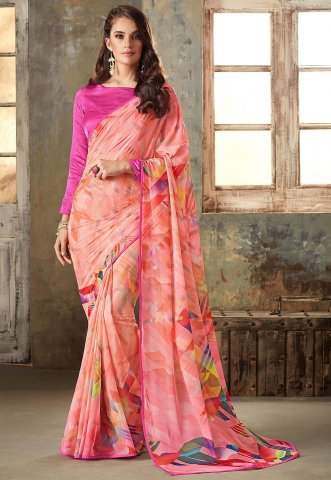
Georgette sarees are party wear ones, which looks excellent on hourglass-shaped bodies and even on wide and fat structures. This georgette saree is in peach colour and has digital print on it. This drape is lightweight and bright in the shade. As unstitched satin jacquard blouse in pink colour is available with this saree. The price for this Georgette Saree is Rs. 2,567, and the shipping is free.
5. Chiffon with Chikankari Embroidery Saree
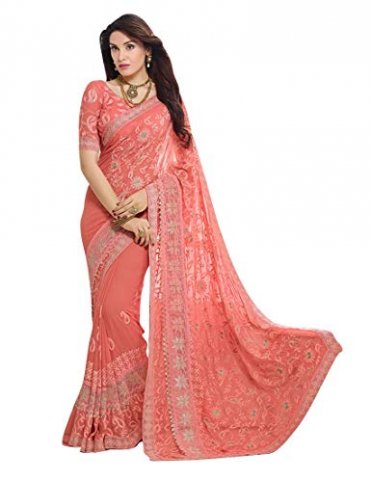
Pure chiffon can make you look elegant and beautiful in no time. The stylish chiffon saree in peach colour is adorned with zari embroidered lace border work with additional motifs. This Chiffon Saree is gorgeously decorated with prints and patterns to give a perfect look which you can wear in daytime family functions, festive wear and social gatherings — the classy saree comes with unstitched and matching blouse piece of same georgette materials that can be stitched according to fittings as needed. This creative saree is priced at Rs. 1,124 with free shipping.
6. Chanderi Saree
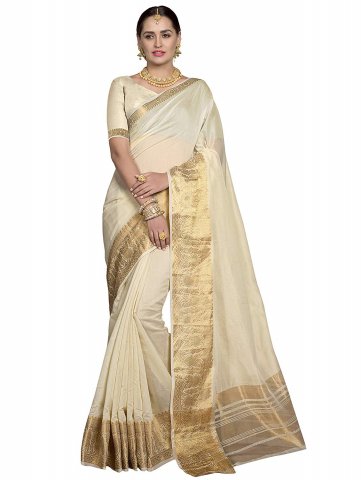
Chanderi Silk is an extremely comfortable saree, that can be worn on any occasion and anytime. This white Chanderi silk is woven with zari work border, and it looks chic for every event. The sari comes with attached blouse piece which is a white chanderi silk unstitched piece, and the length is 0.8 meter. The length of the saree is 6.3 meter. It is a soft comfort to wear saree which looks best form women of every age and suits all occasions icluding festivals. The price of this saree is Rs. 1,099, and it has a free delivery option.
7. Phulkari Saree
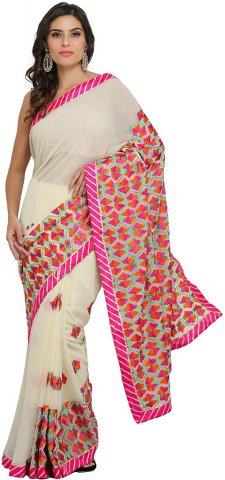
Phulkari is a particular embroidery work in the saree from Punjab with 'bottis' and 'gota' border. This saree is a chiffon fabric, and the colour is pure white. The embroidery phulkari work is made of pink, orange and green. The saree comes with a matching unstitched blouse, and it also includes underskirt. It is a great saree for any body shape and age. It can is worn in daytime occasions and parties easily. The chiffon is comfortable to wear in the summertime, and you can easily carry it. The price for this item is Rs. 4,958, and it has a minimum delivery charge.
8. Kanjeevaram Saree
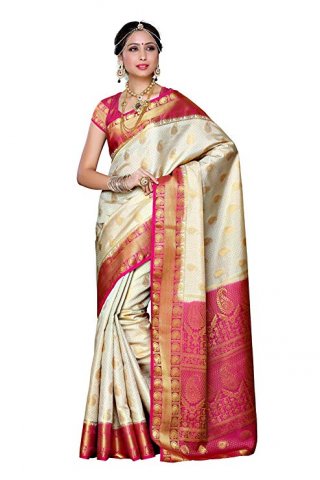
Kanjivaram is a traditional saree which can be worn in any festive day and parties. The Art Silk saree is off-white in colour, and the length of the saree is 6.2 meter. The saree includes a contrast running blouse piece which is the free size, and it is in rani colour, and the length is 0.80 cm. This saree is hand dyed, and much handcraft is included. Pamper yourself with this gift as this saree is gracefully woven by skilled artisans’ using artificial silk threads. The price for this exclusive product is Rs. 1,996, and it has the free delivery option.
Tips to Buy Best Variety of Sarees
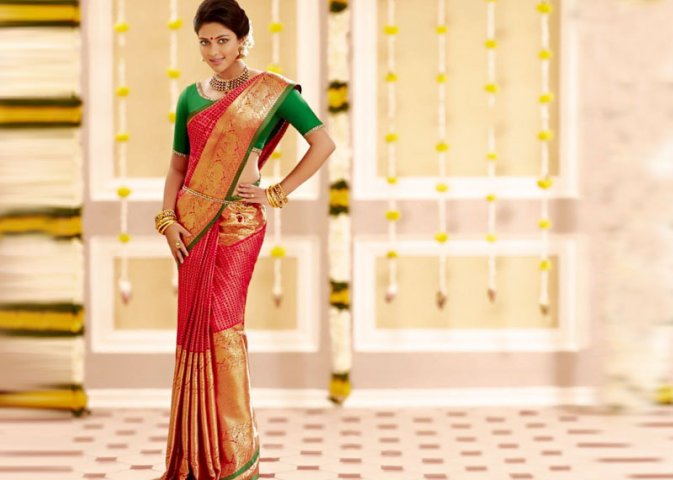
- Choosing the right fabric: Fabric is a strong factor while you select a saree, as it is essential for comfort and flexibility. Most of the materials are made and used according to the season and occasions, and you need to choose accordingly. The material makes contact with the body, and it is important how it feels while you wear.
- Choosing the right design: Prints and designs tells a lot about your style and mindset. It also emphasises your mood, personality, activity and so on. Choose the patterns and compositions according to your body shape. If you are large and short, avoid big and bold prints. If you are comfortable in wearing ethnic design, then pick traditional paisley, geometric, neon, calligraphic prints. If you love to play with prints and styles, India has a different variety of sarees to choose.
- Choose according to base material: Mind the fabric when you buy a saree. The basics like cotton are the original traditional form of Indian saree that can be used in any season and in any time of the year. The net sarees are gorgeous and best for evening wear. The chiffon jacquard sarees are comfortable and elegant to wear comfortably. Silks look traditional and fashionable, and it is a perfect style statement of fashion for Indian women.
- Right saree for right occasion: We use sarees mostly for parties and casual wearing. For the parties, you need the perfect dress to suit the crowd, and saree is the best traditional wear you can think. Party wear sarees are generally attractive and glittering sometimes, depending on the occasion. If it is a designer saree which is highly preferable for parties, are usually exclusive and different than the normal traditional ones. When we talk about casual sarees which woman wear in daily manners are simple and effective in expressing the personality of women. Casual sarees most commonly are used of cotton or synthetic materials and mostly used while at office or home. They are lightweight and not suitable for wedding occasions.
Sarees look dazzling on every, and if you can choose the right saree for the particular occasion, then your wardrobe can be organised and used perfectly around the year. Of course, it depends on your choice, comfort zone and the accessories you wear with the saree.
For those who love to wear sarees and wear it in festivals and functions, sometimes they get confused while buying the perfect saree for themselves. Here is a simple guide to help while you buy a saree:
Step Out Of Your Comfort Zone
Often we stick to saree types that we are used to and know we can handle. But you would be doing an injustice to our country's rich heritage of sarees! So try hunting for authentic sarees belonging to other parts of country. For example, if you've never tried sarees from the east, then explore sarees from Bengal or Assam. It would be not only an interesting experiment, but also one that will give you an opportunity to know more about our country and appreciate our culture. One of the best places to learn about other states' specialties to to visit their handloom outlets if they're available in your location.

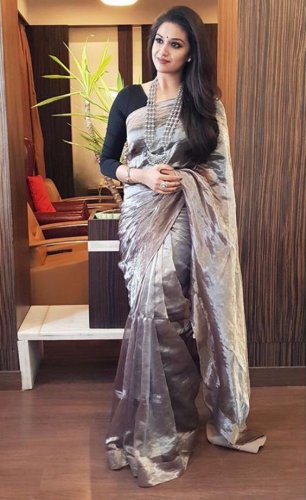
 Highlight the Best Facets of Your Incomparable Beauty: Discover the Best Face Highlighter Currently Available in India and Everything You Need to Know About Using Face Highlighters for Maximum Effect (2023)
Highlight the Best Facets of Your Incomparable Beauty: Discover the Best Face Highlighter Currently Available in India and Everything You Need to Know About Using Face Highlighters for Maximum Effect (2023)
 Forget the Blemishes and Get that Picture Perfect Flawless Radiance on Your Face: Check out the Best Foundations for Oily Skin Currently Available in India and Everything You Need to Know About Makeup Foundations (2023)
Forget the Blemishes and Get that Picture Perfect Flawless Radiance on Your Face: Check out the Best Foundations for Oily Skin Currently Available in India and Everything You Need to Know About Makeup Foundations (2023)
 Make Your Presence Felt Wherever You Go: Discover the Best Perfumes Under 2000 for Both Men and Women to Announce Your Arrival and Make Any Occasion Memorable (2023)
Make Your Presence Felt Wherever You Go: Discover the Best Perfumes Under 2000 for Both Men and Women to Announce Your Arrival and Make Any Occasion Memorable (2023)
 Protect Your Oily Skin from the Harmful Rays of the Sun: Discover the Best Gel Based Sunscreens for Oily Skin and Everything You Need to Know Before Buying One (2023)
Protect Your Oily Skin from the Harmful Rays of the Sun: Discover the Best Gel Based Sunscreens for Oily Skin and Everything You Need to Know Before Buying One (2023)
 Minor Blemishes and Wrinkles Affecting Your Confidence? Check out the Best BB Creams to Conceal Your Worries and Nourish Your Skin to Restore the Healthy, Radiant and Glowing Complexion Back Again (2023)
Minor Blemishes and Wrinkles Affecting Your Confidence? Check out the Best BB Creams to Conceal Your Worries and Nourish Your Skin to Restore the Healthy, Radiant and Glowing Complexion Back Again (2023)
